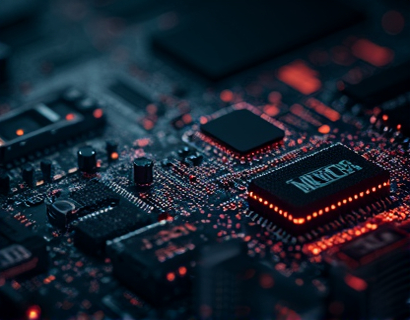Crypto and AI: Unleashing Next-Gen Productivity with Advanced Digital Solutions for Modern Users
In the rapidly evolving digital landscape, the fusion of cryptocurrency and artificial intelligence (AI) is revolutionizing how we approach productivity. As tech-savvy individuals seek innovative solutions to enhance their efficiency, understanding the intersection of these two powerful technologies becomes essential. This article serves as a comprehensive guide to the latest tools and applications that leverage cryptocurrency and AI, providing insights into how they can maximize digital productivity for modern users.
The Rise of Cryptocurrency and AI
Cryptocurrency has transformed the financial world, offering decentralized and secure transactions that challenge traditional banking systems. Meanwhile, AI has made significant strides in automating processes, analyzing data, and enhancing decision-making. Together, these technologies create a synergy that can lead to unprecedented levels of productivity and innovation.
Understanding the Basics
What is Cryptocurrency?
Cryptocurrency is a digital or virtual form of currency that uses cryptography for security. It operates on blockchain technology, which is a decentralized ledger that records all transactions across a network of computers. This decentralization ensures transparency and security, making cryptocurrencies like Bitcoin, Ethereum, and others increasingly popular among users.
What is Artificial Intelligence?
Artificial intelligence refers to the simulation of human intelligence in machines programmed to think and learn. AI encompasses various technologies, including machine learning, natural language processing, and robotics. These technologies enable machines to perform tasks that typically require human intelligence, such as understanding language, recognizing patterns, and making decisions.
The Intersection of Cryptocurrency and AI
The convergence of cryptocurrency and AI presents unique opportunities for enhancing productivity. By integrating AI algorithms with blockchain technology, businesses can streamline operations, improve security, and create more efficient systems. Here are some key areas where this integration is making an impact:
1. Enhanced Data Analysis
AI excels at processing vast amounts of data quickly and accurately. When combined with blockchain, AI can analyze transaction data in real-time, providing insights that help businesses make informed decisions. This capability is particularly valuable in sectors like finance, where understanding market trends and consumer behavior is crucial.
2. Smart Contracts
Smart contracts are self-executing contracts with the terms of the agreement directly written into code. AI can enhance smart contracts by enabling them to adapt based on real-time data inputs. This adaptability can lead to more efficient contract execution and reduced reliance on intermediaries.
3. Fraud Detection and Security
AI algorithms can identify patterns indicative of fraudulent activity within cryptocurrency transactions. By analyzing transaction histories and user behaviors, AI can flag suspicious activities, enhancing security for users and businesses alike. This proactive approach to fraud detection is essential in maintaining trust in digital currencies.
4. Personalized User Experiences
AI can analyze user preferences and behaviors to create personalized experiences in cryptocurrency platforms. By understanding user needs, platforms can offer tailored recommendations, improving user engagement and satisfaction. This personalization is vital in a competitive market where user experience can determine success.
Tools and Applications for Enhanced Productivity
As the integration of cryptocurrency and AI continues to evolve, several tools and applications have emerged to help users maximize their productivity. Here are some noteworthy examples:
1. AI-Powered Trading Bots
Trading bots utilize AI algorithms to analyze market trends and execute trades on behalf of users. These bots can operate 24/7, allowing users to capitalize on market opportunities without constant monitoring. By leveraging historical data and real-time analytics, AI trading bots can make informed decisions, potentially increasing profitability.
2. Decentralized Finance (DeFi) Platforms
DeFi platforms leverage blockchain technology to offer financial services without traditional intermediaries. AI can enhance these platforms by providing risk assessment tools, optimizing lending processes, and improving user interfaces. This combination allows users to access financial services more efficiently and securely.
3. Cryptocurrency Wallets with AI Features
Modern cryptocurrency wallets are incorporating AI features to enhance security and user experience. For instance, AI can help detect unusual transaction patterns, alerting users to potential security threats. Additionally, AI-driven wallets can offer personalized insights into spending habits and investment opportunities.
4. AI-Driven Market Analysis Tools
Market analysis tools powered by AI can provide users with real-time insights into cryptocurrency trends. These tools analyze social media sentiment, news articles, and market data to predict price movements. By utilizing AI for market analysis, users can make more informed investment decisions.
5. Blockchain-Based Project Management Tools
Project management tools that integrate blockchain technology can enhance collaboration and transparency among teams. AI can optimize task assignments, track progress, and analyze team performance. This integration fosters a more efficient workflow, enabling teams to achieve their goals more effectively.
Challenges and Considerations
While the integration of cryptocurrency and AI offers numerous benefits, it also presents challenges that users must navigate. Here are some key considerations:
1. Regulatory Compliance
The regulatory landscape for cryptocurrency is constantly evolving. Users must stay informed about legal requirements and compliance issues to avoid potential pitfalls. Understanding the regulations surrounding cryptocurrency and AI is crucial for businesses operating in this space.
2. Security Risks
As with any digital technology, security risks are a concern. Users must implement robust security measures to protect their assets and data. This includes using secure wallets, enabling two-factor authentication, and staying vigilant against phishing attacks.
3. Ethical Considerations
The use of AI raises ethical questions, particularly regarding data privacy and bias. Users must ensure that AI algorithms are designed and implemented responsibly, taking into account the potential impact on individuals and society.
Future Trends in Crypto and AI
The future of cryptocurrency and AI is promising, with several trends expected to shape the landscape:
1. Increased Adoption of AI in Blockchain
As businesses recognize the benefits of AI in enhancing blockchain applications, we can expect increased adoption of AI technologies. This trend will lead to more innovative solutions that improve efficiency and security in cryptocurrency transactions.
2. Growth of AI-Driven Investment Strategies
AI-driven investment strategies will become more prevalent as users seek to optimize their portfolios. These strategies will leverage machine learning algorithms to analyze market data and identify profitable opportunities.
3. Enhanced Interoperability
Interoperability between different blockchain networks will improve, allowing for seamless transactions across platforms. AI can facilitate this interoperability by providing real-time data analysis and ensuring compatibility between systems.
4. Focus on User-Centric Solutions
As competition in the cryptocurrency space intensifies, platforms will increasingly focus on user-centric solutions. AI will play a crucial role in personalizing user experiences, making it easier for individuals to navigate the complexities of cryptocurrency.
Conclusion
The fusion of cryptocurrency and AI is unlocking new levels of productivity and innovation for modern users. By understanding the tools and applications available, tech professionals and enthusiasts can leverage these technologies to enhance their efficiency and engagement in the digital landscape. As we move forward, staying informed about the latest advancements and trends will be essential for maximizing the benefits of this powerful combination.










































